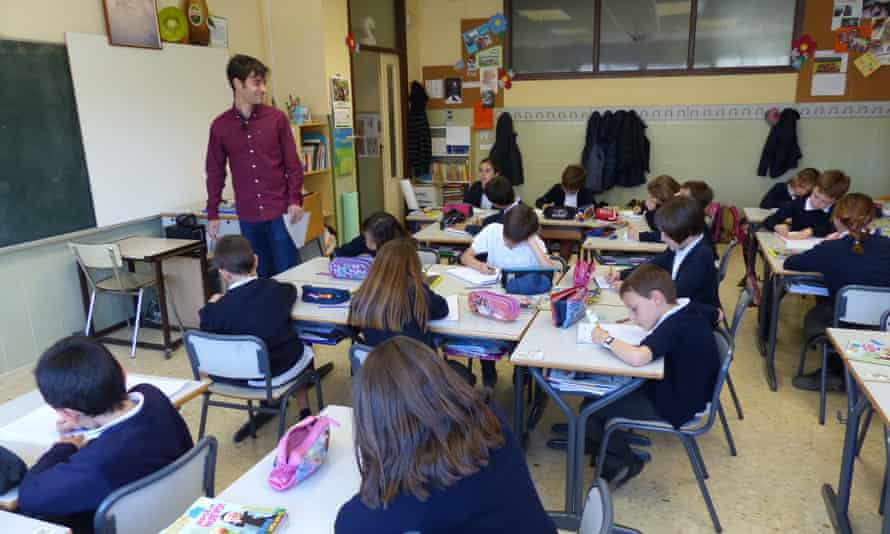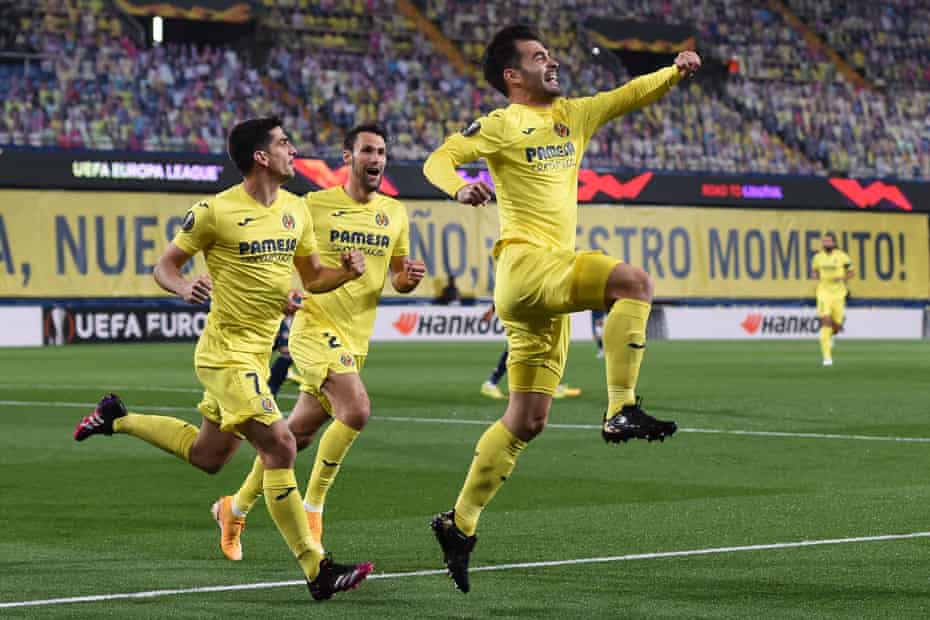One day Manu Trigueros would love to be able to tell his kids about that time he got the goal that helped take Villarreal to their first final. All 25 of his kids. The man who scored the opener in the Europa League semi-final first leg and then conceded the penalty that gave Arsenal hope – a decision he still can’t believe, worse every time he watches it – is a midfielder with class: a footballer and a qualified teacher too.
Trigueros has spent nine years in the first team at Villarreal and three years at the Universidad San Pablo CEU down the road in Castellón. The vice-captain is on the verge of potentially the greatest night in the history of the town’s football team, but at the Nuestra Señora de la Consolación primary school where he completed his training, a 15-minute stroll from the Estadio de la Cerámica, the children know him just as Don Manu, Mr Manu.
On Thursday night Mr Manu will play probably the most important of his 399 games for Villarreal across the first and second teams. He has made more appearances than anyone except Bruno Soriano and Mario Gaspar, but he was never sure of playing one. “I was always worried: ‘Bloody hell, what if I don’t make it?’” he admits. The answer was: teach.
That’s one explanation, another is family. They say sons want to be like their dads; Trigueros is just like his, only better at football. Manolo Trigueros played in the second division with Granada and was at Atlético Madrileño, Atlético Madrid’s B team. He is also a teacher in Talavera de la Reina, in the province of Toledo where Trigueros was brought up. Lupe, his mother, is a teacher too, although she worked at a travel agent’s.
“My parents are teachers, they cracked the whip a lot and made sure that I kept studying,” he says. “And thankfully I listened to them.”

Trigueros says he admires players such as Andrés Iniesta and Real Madrid’s Luka Modric, and that he counted Zinedine Zidane and Ronaldinho among his early idols. His kind of footballer is the kind “who make others better, who break lines and take the team forward, not just go from side to side; those who combine, who are intelligent and improve the rest”. A technical midfielder from that mould, he was likened to Iniesta when he was signed by Barcelona at 15.
Things though didn’t go as he hoped at La Masia – he had never left Talavera before and didn’t find his place in Barcelona – and Trigueros was loaned to the B team at second division Real Murcia for a year before joining Villarreal at 18. He settled in Castellón, 10km away; now he has a small child with his wife, Marta, a doctor, and, at 29, looks like completing his entire career at Villarreal, vital again since Unai Emery shifted to a 4-3-3.
“At Murcia the demands weren’t the same as at La Masia. When I came here, Villarreal B were in the [national, senior] second division and Villarreal C were in tercera; a lot of our first-teamers in recent years have come from there.
“At Villarreal, they put everything in place to help youth-team players succeed. The [model is] players who treat the ball well; they’re not looking for footballers who just hit it long. I spent a year in the residence, two of us to a room. You could see the training pitch from your window, you ate there together. It was all very healthy, all geared to success.”

Geared to, but not guaranteed. Aware that he might not make it, Trigueros studied – first finance and accountancy, which he didn’t like much, then teaching. That continued even when the doubts had been dismissed.
“When I was in the C and the B team, I thought in my head: ‘If I don’t make a living off this, what am I going to do when I’m 35?’ So I covered my back a bit with this. Even when I got to the first team, you never completely rid yourself of that fear that says: ‘If I don’t make it, if something happens, if I get injured, then what do I do?’ Luckily, I kept playing in primera. And on top of that, I have my qualifications in the background. But my first focus was always football.”
Three years after making his debut, Trigueros finished his training, English and mental development his final modules. There was theory and practice too. “I enjoy it; educating children is fulfilling and they surprise you every day. I’m fun with them more than strict, but when it’s time to be responsible, it’s time to be responsible. It clears your mind. And if you don’t do something, you have a lot of afternoons and you get bored. And when you stop playing, then what? Just go to the gym?
“When I retire at 30-something, I’ll be able to do something. Even if it’s not [a full-time job] I’d like to do two or three hours a morning, maybe do some PE lessons.”
Sign up to The Recap, our weekly email of editors’ picks.
Not coach, then? What’s harder to manage, 25 footballers or 25 kids aged six or seven?
“As you get older it’s true your interest in coaching grows,” Trigueros says. “A group of professionals is more complicated. Luckily, we have a very good dressing room. Villarreal is a family club from a small town of 50,000 people that works hard to avoid introducing people into the dressing room that damage the group. Teammates say it’s harder at some clubs. Imagine being a manager trying to keep that many people happy. Players don’t always realise. Like dads say to kids: ‘When you’re a parent, you’ll see.’ I think a dressing room is probably harder than a classroom.”
from Football | The Guardian https://ift.tt/3tqhZkV
via IFTTT

No Comment